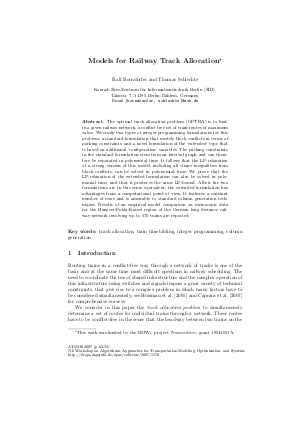05. Models for Railway Track Allocation
Authors Ralf Borndörfer, Thomas Schlechte
-
Part of:
Volume:
7th Workshop on Algorithmic Approaches for Transportation Modeling, Optimization, and Systems (ATMOS'07) (ATMOS 2007)
Part of: Series: Open Access Series in Informatics (OASIcs)
Part of: Conference: Symposium on Algorithmic Approaches for Transportation Modelling, Optimization, and Systems (ATMOS) - License:
 Creative Commons Attribution-NonCommercial-NoDerivs 3.0 Unported license
Creative Commons Attribution-NonCommercial-NoDerivs 3.0 Unported license
- Publication Date: 2007-11-06
File

PDF
OASIcs.ATMOS.2007.1170.pdf
- Filesize: 264 kB
- 17 pages
Document Identifiers
Subject Classification
Keywords
- Track allocation
- train timetabling,integer programming
- column generation
Metrics
- Access Statistics
-
Total Accesses (updated on a weekly basis)
0Document
0Metadata
Abstract
The optimal track allocation problem (OPTRA) is to find, in a given railway network, a conflict free set of train routes of maximum value. We study two types of integer programming formulations for this problem: a standard formulation that models block conflicts in terms of packing constraints, and a novel formulation of the `extended' type that is based on additional `configuration' variables. The packing constraints in the standard formulation stem from an interval graph and can therefore be separated in polynomial time. It follows that the LP-relaxation of a strong version of this model, including all clique inequalities from block conflicts, can be solved in polynomial time. We prove that the LP-relaxation of the extended formulation can also be solved in polynomial time, and that it produces the same LP-bound. Albeit the two formulations are in this sense equivalent, the extended formulation has advantages from a computational point of view. It features a constant number of rows and is amenable to standard column generation techniques. Results of an empirical model comparison on mesoscopic data for the Hanover-Fulda-Kassel region of the German long distance railway network are reported.
Cite As Get BibTex
Ralf Borndörfer and Thomas Schlechte. 05. Models for Railway Track Allocation. In 7th Workshop on Algorithmic Approaches for Transportation Modeling, Optimization, and Systems (ATMOS'07). Open Access Series in Informatics (OASIcs), Volume 7, pp. 62-78, Schloss Dagstuhl – Leibniz-Zentrum für Informatik (2007)
https://doi.org/10.4230/OASIcs.ATMOS.2007.1170
BibTex
@InProceedings{borndorfer_et_al:OASIcs.ATMOS.2007.1170,
author = {Bornd\"{o}rfer, Ralf and Schlechte, Thomas},
title = {{05. Models for Railway Track Allocation}},
booktitle = {7th Workshop on Algorithmic Approaches for Transportation Modeling, Optimization, and Systems (ATMOS'07)},
pages = {62--78},
series = {Open Access Series in Informatics (OASIcs)},
ISBN = {978-3-939897-04-0},
ISSN = {2190-6807},
year = {2007},
volume = {7},
editor = {Ahuja, Ravindra K. and Liebchen, Christian and Mesa, Juan A.},
publisher = {Schloss Dagstuhl -- Leibniz-Zentrum f{\"u}r Informatik},
address = {Dagstuhl, Germany},
URL = {https://drops.dagstuhl.de/entities/document/10.4230/OASIcs.ATMOS.2007.1170},
URN = {urn:nbn:de:0030-drops-11701},
doi = {10.4230/OASIcs.ATMOS.2007.1170},
annote = {Keywords: Track allocation, train timetabling,integer programming, column generation}
}
